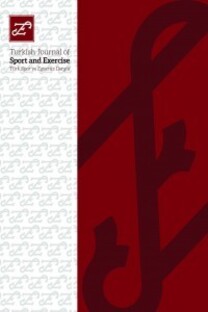The relation between the self-esteem levels and decision- making styles of the students doing sports and the students not doing sports in high schools
The relation between the self-esteem levels and decision- making styles of the students doing sports and the students not doing sports in high schools
The objective of this study to determine the self-esteem levels and decision-making styles of the students studying at high schools according to their state of doing and not doing sports and to reveal whether there is a relation between their selfesteem levels and decision-making styles. The research group has been constituted by total 403 students, 114 of whom were doing sports and 289 not doing sports, studying at the high schools acting under Konya Provincial Education Directorate in the first half of the 2014-2015 school year. The group doing sports consisted of the students representing their schools and having taken part in competitions in different branches and the group not doing sports was constituted by the students studying in different departments of the same school and not active in a branch. In the study, as the data collection tool, “Coopersmith Self-esteem Inventory” developed by Coopersmith and adapted to Turkish by Turan & Tufan as well as “Decision-making Scale in Adolescents” developed by Mann et al. and adapted to Turkish by Çolakkadıoğlu were used. The fact that whether the data were distributed normally or not was scrutinized by the Kolmogorov-Smirnov test and following such scrutiny, as the data were distributed normally, Pearson moment correlation (r) coefficient technique was used to reveal the relation between the self-esteem levels and decision-making styles of students. α=0.05 was chosen as the significance level in the study. At the end of the study, it was determined that both the self-esteem levels and decision-making styles of the students doing sports were higher than those who do not do sports. It was ascertained in the students doing sports that there is a relation at moderate level and positive tendency between their self-esteem levels and self-respect in decision-making; at low level and negative tendency between their apathy and avoidance of responsibility decision-making styles, and at moderate level and negative tendency between their panic decision-making styles. In the students not doing sports, a relation at low level and positive tendency in their self-esteem levels and self-respect in decision-making and cautious-selectivity decision-making styles, and at low level and negative tendency between their panic and avoidance of responsibility decision-making styles, was determined
___
- 1. Adair J. Karar Verme ve Problem Çözme. (Çev: Kalaycı N.), Edit: Atay M.T., Ankara: Gazi Kitabevi, 2000.
- 2. Büyüköztürk Ş. Data Analysis Handbook for Social Sciences. Ankara: Pegem A Yayıncılık, 2007.
- 3. Coopersmith S. Self–Esteem Inventories. Consulting Psychologist Pres, Inc. 3803 E. B. Ayshore Road, Palo Alto, CA 94303, 1991.
- 4. Coopersmith S. The Antecedents of Self-Esteem. San Fransisco: W.H. Freeman and Company, 1974.
- 5. Çolakkadıoğlu O. Ergenlerde Karar Verme Ölçeği’nin Uyarlama Çalışması. Yayınlanmamış yüksek lisans tezi, Çukurova Üniversitesi Sosyal Bilimler Enstitüsü, 2003.
- 6. Çuhadaroğlu F. Adolesanlarda Benlik Saygısı. Yayınlanmış Uzmanlık Tezi, Hacettepe Üniversitesi Tıp Fakültesi, Ankara, 1986.
- 7. Deniz, M.E. Investigation of the relation between decision making self-esteem, decision making style and problem solving skills of university students. Eurasian Journal of Educational Research, 2004; 15: 23-35.
- 8. Eldeleklioğlu J. Karar stratejileri ile ana-baba tutumlari arasindaki ilişki. Unpublished Doctoral Thesis, Gazi University, Institute of Health Sciences, Ankara, 1996.
- 9. Ersever, Ö.H. Karar verme becerileri kazandirma programinin ve etkileşim grubu deneyiminin üniversite öğrencilerinin karar verme stilleri üzerindeki etkileri. Unpublished Doctoral Thesis, Ankara University, Institute of Social Sciences, Ankara, 1996.
- 10. İlmez M. Bir kamu kurumundaki görevli yöneticilerin ve çalışanların liderlik stilleri ile karar verme stilleri arasındaki ilişkinin belirlenmesi. Unpublished Master Thesis, Ufuk University, Institute of Social Sciences, 2010.
- 11. Karasar N. Bilimsel Araştırma Yöntemi. Ankara: Nobel Yayıncılık, 2004.
- 12. Kasatura İ. Kişilik ve Özgüven Psikoloji Dizisi 4. İstanbul: Evrim Yayınları, 1998.
- 13. Korkmaz HN. Yaz spor okullari ile çocuklarin benlik saygisi arasindaki ilişki. Uludağ University J Education Faculty, 2007.
- 14. Köknel Ö. Kaygıdan Mutluluğa Kişilik. İstanbul: Altın Kitapevi, 1985.
- 15. Kurt Ü. Karar verme sürecinde yöneticilerin kişilik yapılarının etkileri. Başkent University, Institute of Social Sciences, Ankara, 2003.
- 16. Mann L, Harmoni R, Power C. Adolescent decision-making: The development of competence. Journal of Adolescence, 1989; 12(3): 265-278.
- 17. Radford MHB, Mann L, Ohta Y, Nakane Y. Difference between Australian and Japanese students in reported use of decision processes. International Journal Psychology, 1991; 26: 35-32.
- 18. Scvaneveldt YD, Adams GR. Adolescents and the decision making process. Theory into Practice, 1983; 22(2): 98-104.
- 19. Sevinç M. Erken Çocuklukta Gelişim ve Eğitimde Yeni Yaklaşımlar. 1. Baskı, İstanbul: Morpa Kültür Yayınları, 2003.
- 20. Taşgit MS. Üniversite öğrencilerinin benlik saygısı ve karar verme düzeylerinin incelenmesi. Unpublished Master Thesis, Karamanoğlu Mehmet Bey University, Institute of Social Sciences, Karaman, 2012.
- 21. Turan N, Tufan B. Coopersmith Benlik Saygısı Envanteri’nin (SEI) Geçerlik-Güvenirlik Çalışması. İstanbul: In: 23. Ulusal Psikiyatri ve Nörolojik Bilimler Kongresi; 1987; 816-817.
- 22. Yeşilyaprak B. Eğitimde Rehberlik Hizmetleri Gelişimsel Yaklaşım. Ankara: Nobel Yayın Dağıtım, 2003.
- 23. Yiğit H. Ergenlerin benlik saygılarının yaşam doyumu ve bazı özlük nitelikleri açısından incelenmesi. Unpublished Master Thesis, Selçuk University, Institute of Education Sciences, Konya, 2010.
- 24. Yörükoğlu, A. Gençlik Çağı Ruh Sağlığı Eğitimi ve Ruhsal Sorunları. 5. Baskı, İstanbul: Türkiye İş Bankası Kültür Yayınları Sosyal ve Felsefi Eserler Dizisi, 1988.
- Başlangıç: 1999
- Yayıncı: Selçuk Üniversitesi, Spor Bilimleri Fakültesi
Sayıdaki Diğer Makaleler
Cengiz AKARCESME, Zait Burak AKTUG, Hasan AKA, Serkan IBIS
Menderes KABADAYI, Ali Kerim YILMAZ, Gul CAVUSOGLU, Samet Hasan ABACI, M Yalcin TASMEKTEPLIGIL
Gul CAVUSOGLU, Ali Kerim YILMAZ, Menderes KABADAYI, Hasan Samet ABACI, Mehmet Yalcin TASMEKTEPLIGIL
Mojtaba HASANNEJAD, Ali ZAREI, Farideh ASHRAFGANJOUEI
Abdullah Sencer TEMEL, Erkan Faruk SIRIN
Abdullah Ruhi SOYLU, Deniz SIMSEK, Izzet KIRKAYA
Enes ISIKGOZ, Melike ESENTAS, Nevzat DINCER
Erkan Faruk ŞİRİN, Abdullah Sencer TEMEL
Ebru CETIN, Ulviye BILGIN, Mergul COLAK, İmdat YARIM, Halil TASKIN
